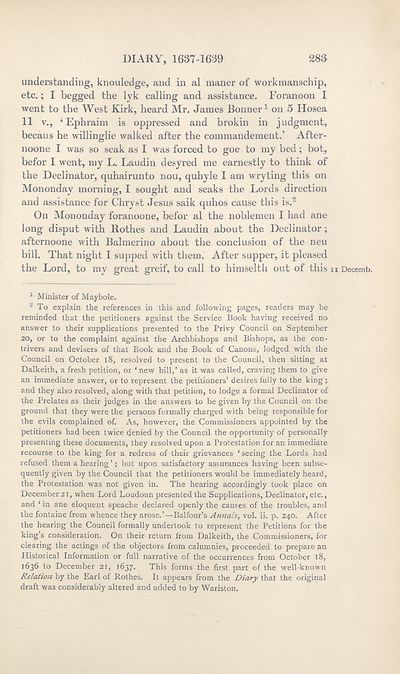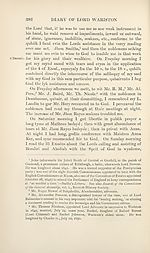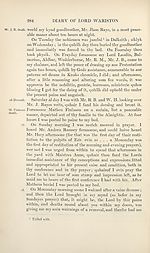Series 1 > Diary of Sir Archibald Johnston of Wariston 1632-1639
(342) Page 283
Download files
Complete book:
Individual page:
Thumbnail gallery: Grid view | List view

DIARY, 1637-1639
283
understanding, knouledge, and in al maner of workmanschip,
etc.; I begged the lyk calling and assistance. Foranoon I
went to the West Kirk, heard Mr. James Bonner1 on 5 Hosea
11 v., ‘Ephraim is oppressed and brokin in judgment,
becaus he willinglie walked after the commandement.’ After-
noone I was so seak as I was forced to goe to my bed; bot,
befor I went, my L. Laudin desyred me earnestly to think of
the Declinator, quhairunto nou, quhyle I am wryting this on
Mononday morning, I sought and seaks the Lords direction
and assistance for Chryst Jesus saik quhos cause this is.2
On Mononday foranoone, befor al the noblemen I had ane
long disput with Rothes and Laudin about the Declinator;
afternoone with Balmerino about the conclusion of the neu
bill. That night I supped with them. After supper, it pleased
the Lord, to my great greif, to call to himselth out of this u Decemb.
1 M inister of Maybole.
2 To explain the references in this and following pages, readers may be
reminded that the petitioners against the Service Book having received no
answer to their supplications presented to the Privy Council on September
20, or to the complaint against the Archbishops and Bishops, as the con¬
trivers and devisers of that Book and the Book of Canons, lodged with the
Council on October 18, resolved to present to the Council, then sitting at
Dalkeith, a fresh petition, or ‘new bill,’ as it was called, craving them to give
an immediate answer, or to represent the petitioners’ desires fully to the king;
and they also resolved, along with that petition, to lodge a formal Declinator of
the Prelates as their judges in the answers to be given by the Council on the
ground that they were the persons formally charged with being responsible for
the evils complained of. As, however, the Commissioners appointed by the
petitioners had been twice denied by the Council the opportunity of personally
presenting these documents, they resolved upon a Protestation for an immediate
recourse to the king for a redress of their grievances ‘seeing the Lords had
refused them a hearing ’; but upon satisfactory assurances having been subse¬
quently given by the Council that the petitioners would be immediately heard,
the Protestation was not given in. The hearing accordingly took place on
December 2i, when Lord Loudoun presented the Supplications, Declinator, etc.,
and ‘ in ane eloquent speache declared openly the causes of the troubles, and
the fontaine from whence they arose.’—Balfour’s Annals, vol. ii. p. 240. After
the hearing the Council formally undertook to represent the Petitions for the
king’s consideration. On their return from Dalkeith, the Commissioners, for
clearing the actings of the objectors from calumnies, proceeded to prepare an
Historical Information or full narrative of the occurrences from October 18,
1636 to December 21, 1637. This forms the first part of the well-known
Relation by the Earl of Rothes. It appears from the Diary that the original
draft was considerably altered and added to by Wariston.
283
understanding, knouledge, and in al maner of workmanschip,
etc.; I begged the lyk calling and assistance. Foranoon I
went to the West Kirk, heard Mr. James Bonner1 on 5 Hosea
11 v., ‘Ephraim is oppressed and brokin in judgment,
becaus he willinglie walked after the commandement.’ After-
noone I was so seak as I was forced to goe to my bed; bot,
befor I went, my L. Laudin desyred me earnestly to think of
the Declinator, quhairunto nou, quhyle I am wryting this on
Mononday morning, I sought and seaks the Lords direction
and assistance for Chryst Jesus saik quhos cause this is.2
On Mononday foranoone, befor al the noblemen I had ane
long disput with Rothes and Laudin about the Declinator;
afternoone with Balmerino about the conclusion of the neu
bill. That night I supped with them. After supper, it pleased
the Lord, to my great greif, to call to himselth out of this u Decemb.
1 M inister of Maybole.
2 To explain the references in this and following pages, readers may be
reminded that the petitioners against the Service Book having received no
answer to their supplications presented to the Privy Council on September
20, or to the complaint against the Archbishops and Bishops, as the con¬
trivers and devisers of that Book and the Book of Canons, lodged with the
Council on October 18, resolved to present to the Council, then sitting at
Dalkeith, a fresh petition, or ‘new bill,’ as it was called, craving them to give
an immediate answer, or to represent the petitioners’ desires fully to the king;
and they also resolved, along with that petition, to lodge a formal Declinator of
the Prelates as their judges in the answers to be given by the Council on the
ground that they were the persons formally charged with being responsible for
the evils complained of. As, however, the Commissioners appointed by the
petitioners had been twice denied by the Council the opportunity of personally
presenting these documents, they resolved upon a Protestation for an immediate
recourse to the king for a redress of their grievances ‘seeing the Lords had
refused them a hearing ’; but upon satisfactory assurances having been subse¬
quently given by the Council that the petitioners would be immediately heard,
the Protestation was not given in. The hearing accordingly took place on
December 2i, when Lord Loudoun presented the Supplications, Declinator, etc.,
and ‘ in ane eloquent speache declared openly the causes of the troubles, and
the fontaine from whence they arose.’—Balfour’s Annals, vol. ii. p. 240. After
the hearing the Council formally undertook to represent the Petitions for the
king’s consideration. On their return from Dalkeith, the Commissioners, for
clearing the actings of the objectors from calumnies, proceeded to prepare an
Historical Information or full narrative of the occurrences from October 18,
1636 to December 21, 1637. This forms the first part of the well-known
Relation by the Earl of Rothes. It appears from the Diary that the original
draft was considerably altered and added to by Wariston.
Set display mode to:
![]() Universal Viewer |
Universal Viewer | ![]() Mirador |
Large image | Transcription
Mirador |
Large image | Transcription
Images and transcriptions on this page, including medium image downloads, may be used under the Creative Commons Attribution 4.0 International Licence unless otherwise stated. ![]()
| Scottish History Society volumes > Series 1 > Diary of Sir Archibald Johnston of Wariston 1632-1639 > (342) Page 283 |
|---|
| Permanent URL | https://digital.nls.uk/127534933 |
|---|
| Attribution and copyright: |
|
|---|
| Description | Over 180 volumes, published by the Scottish History Society, containing original sources on Scotland's history and people. With a wide range of subjects, the books collectively cover all periods from the 12th to 20th centuries, and reflect changing trends in Scottish history. Sources are accompanied by scholarly interpretation, references and bibliographies. Volumes are usually published annually, and more digitised volumes will be added as they become available. |
|---|


